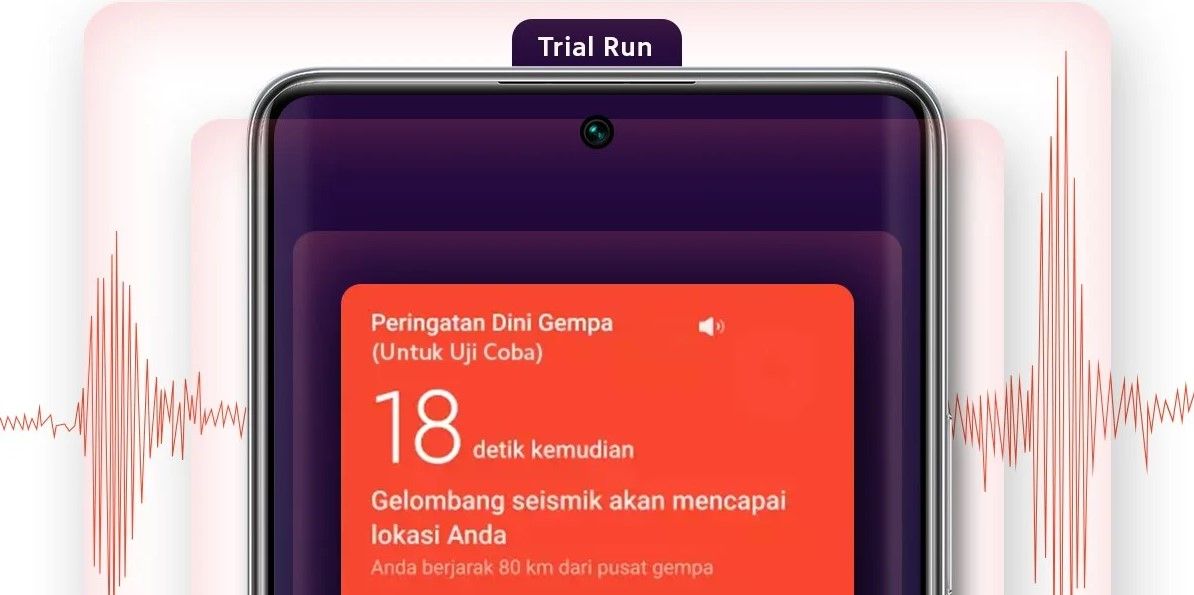Xiaomi Has Added An Earthquake Warning System To Its Handsets
Xiaomi, In Collaboration With Chinese And Indonesian Government Agencies, Has Added The EEW System To Several Handsets To Alert Users Before The Second Wave Arrives.
According to the registry media, Xiaomi has recently added an earthquake warning system to its smartphones. Adding this feature to Xiaomi phones has begun on a trial basis in Indonesia. The earthquake warning system results from a collaboration between Xiaomi and Chinese and Indonesian government agencies.
The Xiaomi system, called EEW (Earthquake Early Warning), is available on devices with versions 12, 12.5, or 13 of the MIUI interface, giving “near vibrations” to users in Indonesia who have enabled this feature. Warns.
Xiaomi, which is now one of the largest smartphone manufacturers in the world and has a large number of users, especially in Iran, claims that the EEW system provides “alarm time from a few seconds to tens of seconds” by checking the speed of electric waves before the secondary wave arrives.
The speed of these electric waves is naturally much faster than the secondary waves of an earthquake.

An example of an earthquake warning system in Xiaomi phones
Users living in earthquake-affected areas will receive visual and audible alerts on their devices. The EEW system’s visual attention includes the magnitude of the earthquake, the estimated arrival time, and the magnitude of the impending earthquake.
The EEW service only displays warnings when four or more earthquakes occur based on a modified Mercalli magnitude scale. Indonesia is one of the countries with the most active volcanoes globally, and small earthquakes usually occur in this country.
Also, due to Indonesia’s position in the seismic belt of the Pacific Ocean, the inhabitants of this country are constantly witnessing large earthquakes.
The United States Geological Survey reports that more than 150 earthquakes greater than seven occurred in Indonesia between 1901 and 2019. Indonesia has hosted a significant earthquake on average once every nine months. Earthquakes like these are the same earthquakes that affect the world’s news media and cause heavy human and financial losses.
Xiaomi Earthquake Alarm System is currently available in Indonesia.
Xiaomi Developed The Xiaomi EEW system due to a collaboration between the Care-Life Institute (ICL) in Chengdu, China, and the Indonesian Meteorological, Climatological, and Geophysical Agency (BMKG).
The ICL, sponsored by the Chinese Ministry of Science and Technology, began work on earthquake detection technology in 2008. The agency says it has sent 65 devastating earthquake warnings to Chinese residents “without any false alarms.” More than a decade after the development of seismic detection technology began, the ICL partnered with BMKG to bring the system to Indonesia.
The system works in China in that the user must first install special software such as the US Emergency Distribution System.
After this, an earthquake alert is sent to the user via the Internet. The ICL has been able to add an earthquake warning system to 13 Chinese cities in Sichuan.
The Indonesian version of ICL technology takes everything to a new level due to its collaboration with Xiaomi.
Indonesia is the second country to host EEW, but it first uses this technology on mobile phones.
We have seen the development of similar systems for earthquakes and other natural disasters before. In 2016, an app developed by the University of California, Berkeley, and Deutsche Telekom used the accelerometer sensor on smartphones to detect seismic activity and alert users.
The app, called MyShake, received a variety of reactions. Users have repeatedly said that MyShake consumes a lot of power, displays alerts frequently, and sometimes does not issue any alerts. The designers of MyShake explicitly stated that their application could not replace traditional seismic networks.
Xiaomi’s EEW technology, on the other hand, relies on these traditional systems.
Xiaomi said that after activating EEW on the phone, when the seismological organization detects that an earthquake has occurred, it shares the initial warning data through a dedicated channel with Xiaomi servers. Xiaomi makes this data available to users.

